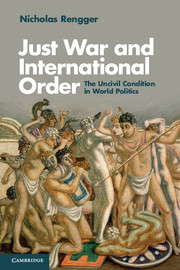3 - Just war: ambiguous tradition
Published online by Cambridge University Press: 05 April 2013
Summary
Whether the State can loose and bind
In Heaven as well as on Earth:
If it be wiser to kill mankind
Before or after the birth –
These are matters of high concern
Where State-kept schoolmen are;
But Holy State (we have lived to learn)
Endeth in Holy War.
. . .
Whatsoever, for any cause,
Seeketh to take or give
Power above or beyond the Laws,
Suffer it not to live!
Kipling, ‘MacDonough's Song’
The period since the end of the Second World War, and most especially the period from the 1970s to the present, has seen a revival of normative theorizing about war unparalleled since the seventeenth century. Both religious and, especially, secular theorizing have focused to a very large extent on working broadly within the parameters of the most influential European tradition of thought connected with war: the just war tradition. This is true even where (as in some recent cosmopolitan work) the tradition is also greatly reworked and true also in the worlds of political rhetoric and military law, as witnessed by the constant recitation of central in bello principles by senior Allied officers in Afghanistan and Iraq, and by the regular invocation of the tradition by politicians.
- Type
- Chapter
- Information
- Just War and International OrderThe Uncivil Condition in World Politics, pp. 63 - 101Publisher: Cambridge University PressPrint publication year: 2013



